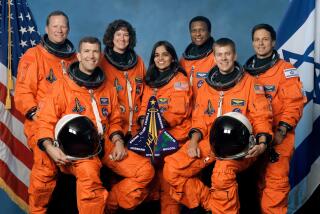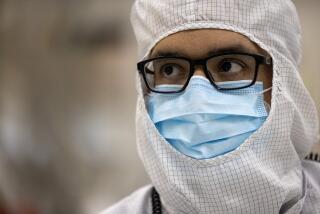The Role of ‘Ordinary’ People in Space
- Share via
Like almost everyone I know, the Challenger tragedy shattered my routine, filling me with a compulsion to learn every detail about the spacecraft and the individual astronauts who died. All the while, however, caught up in the event myself, I have wondered at the magnitude of individual and national grief. Though certainly enhanced by the media, it was not created by it.
We are used to tragedy. In the last few months thousands died in the Mexican earthquake, thousands more in the Colombian eruption; closer to home, more than 200 American servicemen lost their lives in the cold wastes of Newfoundland. Recently heavy rains caused several freeway auto deaths. But these others seem to have been victims of fate.
The deaths of the Challenger crew were different. From the euphoria of the Uranus flyby--a spacecraft launched nine years ago and off by only one minute from its predicted rendezvous almost 2 billion miles from Earth, we fell into profound grief and insecurity. The fate of the Challenger touched us where we are most vulnerable.
First Teacher in Space
The crew members represented the best of our nation. They were all volunteers who had surpassed myriad competitors in their specialties. Some were individuals who had emerged from remote and simple backgrounds, proving once again that Americans of either sex as well as from all races and creeds can achieve excellence and recognition. They were an uncanny reflection of the nation, representing not only our heterogenous origins but the breadth of our professional callings. For this crew included, of course, the first teacher in space. She was not even a science teacher. Her presence undoubtedly heightened the pain for everyone.
Christa McAuliffe represented two constituencies when she climbed into the spacecraft. As an educator, she stood for one of the oldest professions, one that has suffered nationally from a dwindling degree of prestige and which, by being represented on this flight, was receiving important national attention. In addition, however, Christa McAuliffe represented Everyman. She was not the only parent of young children in the crew, but she was the only mother and identified as one. She looked like the girl next door. When she waved cheerfully to the crowds before climbing aboard, she signaled the same reflexive faith in technology to which all of us consent when we place our children on school buses each morning. Many of us identified with Christa, and her vulnerability to the vagaries of high-tech is our own.
We accept the “miracles” of technology because we are too committed to this complicated industrial society to jettison it. Much as we decry the evils of the internal combustion engine, we take to the highway when we have an emergency and are grateful that speed saves more lives than it takes. Like Christa, we live with a faith in the technologies of optics, aerodynamics and computers that few of us understand.
The rest of the astronauts, it has been argued in the past few days, had opted for a life of danger and were thus in some ways prepared. Those who had been test pilots had reckoned with the odds for years. Less so the payload specialists, but scientists or engineers, they supposedly understood the dangers involved in traveling in any gravity-breaking vehicle.
Technology Proved to Be Imperfect
Christa McAuliffe was not naive, and I am certain that she was aware that her adventure carried no guarantee. But to the citizenry prepared to accompany her on what was called “the ultimate field trip,” her confidence fed an irrational need to believe that the risk was no greater than the ones all of us take when we climb into our automobiles. In truth, every time I board the plane to commute between Burbank and Oakland, I am acting as confident in the workings of high tech as Christa seemed that Tuesday morning. It was that confidence that the explosion shattered. Like all of us, she stepped into the protective arms of technology, but technology let her down. Thus in mourning her bravery, we are also mourning our own lost faith.
Calls have been issued in recent days against the idea of launching an “ordinary” citizen into orbit along with the technically proficient professional astronauts. Yet very little was “ordinary” about Christa McAuliffe. She had emerged as the best qualified, experienced, professional teacher, and she had had intensive additional training for her mission on the shuttle.
Her role, and the anticipated role of a journalist on board some later flight, is not equivalent to adding ballast to the crew. Her role is as important to the total value of space exploration as those of the other astronauts who are adept at launching satellites.
The climate today augurs more military incursions into what began 25 years ago as a civilian adventure. If we are to rescue the exploration of space from those who will use increasingly complicated technology for the installation of equally risky weapons systems, it is crucial that the space program continues to include extraordinary citizens like Christa McAuliffe--as well as journalists and poets--who can convey its still unimaginable wonders to those of us who are simply “ordinary” people.






